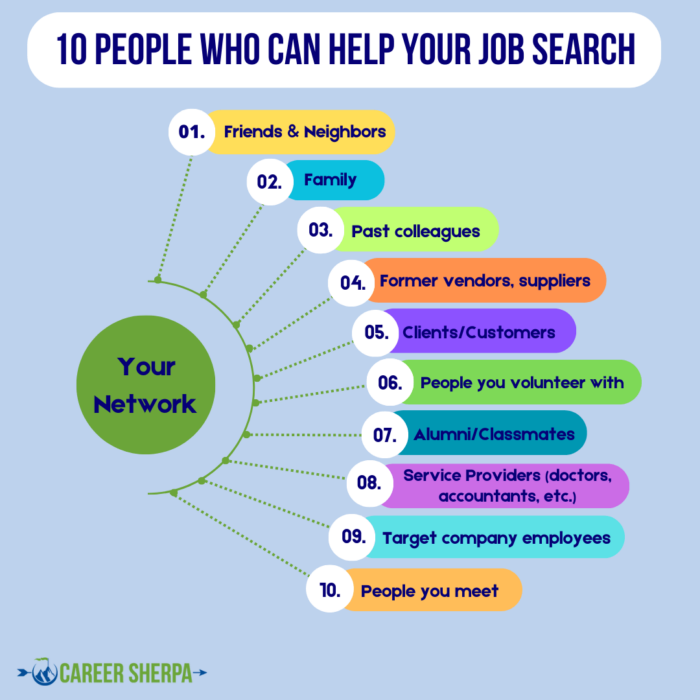Title:Creating a Network from Scratch
Author:Hannah Morgan
Date:April 2024
Source:Career Sherpa - Reprinted with permission
If you are new to job search and you are turned off by hearing you should network, you should know this.
You have been networking all along, but you just didn't call it that. Take the focus off of job search and you'll feel better about "networking".
The Harvard Business Review wrote this piece on how leaders create networks. "How Leaders Create and Use Networks".
The article defines networking as: "creating a fabric of personal contacts who will provide support, feedback, insight, resources, and information..."
You need support, feedback, insight, resources and information, right? While your first instinct is to ask about open jobs, reframe your conversations to seek out these other things.
The idea behind this brief is that there are 3 different types of networks:
- Personal: people outside of your company who can assist in your professional development
- Operations: those you need to complete tasks or accomplish work
- Strategic: people who can help you reach company goals/objectives
I love this idea because it provides a structure and plan for moving forward. Instead of meeting all kinds of people with no purpose or reason, you know why you want to meet someone. This fosters a lifetime commitment to networking.
For active job seekers, you'll want to make a list of people from these parts of your life. Read more about the 10 types of people to network with.

Diversify Your Networking Strategy
Information can come from many different sources. I strongly recommend beginning the outreach process with those people you know best. They already know you, are more empathetic, and most importantly, more willing to help.
Once you have started reaching out to people in your network, it's time to expand the people you know and whom you can ask for information, resources, and insight.
Look for these opportunities to expand and grow your network:
- Attend industry events, conferences, and meetups
- Use online platforms (LinkedIn, X/Twitter, professional forums)
- Join professional organizations or clubs
- Informational interviews and coffee meetings (with alumni, past colleagues, etc.)
- Stay in touch with former colleagues and classmates
- Volunteer or get involved in community projects
Network The Right Way
There is a right way to network without feeling yucky or like a used car salesperson. Focus on learning about the other person first! You can do this by knowing what you want to learn about them and what you can learn from them.
Ask Questions. Be curious.
- When reconnecting with people you know, ask about their life, what's new, how their family is doing — make it personal.
- When reaching out to a professional contact (someone you used to work with), you can still ask what's new in a professional way.
- And when meeting someone new, you can ask what they do, what brought them to this event, why they like working for the company, or any question that helps you get to know them better.
You don't need to start the conversation with your job search woes. But you do need to have a response when asked "So what do you do." You can see some responses here.
You will also want to have some questions prepared or top of mind to get the conversation flowing so you can acquire advice, information, or recommendations. Check this list of questions to help you have a productive networking conversation.
Follow Up and Stay In Touch
First things first. If someone has given you their time, thank them. Additionally, you may acquire helpful information. Be sure to let the individual know you appreciate their help.
But don't stop there. One of the hardest parts of networking is staying in touch. Some people use their calendars to set a "touch base" date. This depends on the person and your relationship with them. A good rule of thumb is to touch base monthly with key people in your network while you are actively job seeking. If you are networking for your career development, you may reconnect with key people in your network every six months.
Offer Value and Be Helpful
One of the things you should be listening for is the opportunity to help the person you are speaking with. This will be based on your conversation. You may be able to offer solutions to a problem they are experiencing, or you may be able to introduce them to someone they should know. It could even be letting them know about a newsletter or event you think they would benefit from.
If you can't think of anything, you can always end your conversation with
"Thank you so much for your time today. I've learned a lot. Is there anything I can do to help you today?"
You are never really building a network from scratch. You have one, you just need to understand how to tap into the power of people you already know. Start by identifying people you already know and strategically reach out and ask for advice, information or recommendations!

